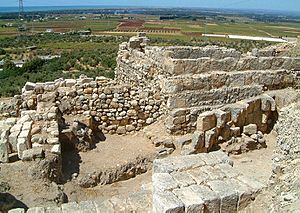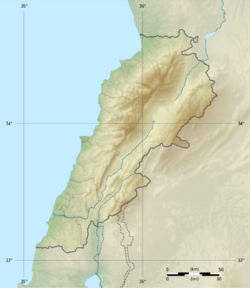Arqa facts for kids
Quick facts for kids
Arqa
عرقا
|
|
|---|---|
|
City
|
|

remains of Crusader Castle, Arqa
|
|
| Country | |
| Governorate | Akkar |
| District | Akkar |
| Time zone | UTC+2 (EET) |
| • Summer (DST) | UTC+3 (EEST) |
| Dialing code | +961 |
Arqa (Arabic: عرقا, romanized: ʿArqā) is a village in Lebanon. It is located in the Akkar Governorate, about 22 kilometers (14 miles) northeast of Tripoli. Arqa is very close to the coast.
This town was an important city-state during the Iron Age. The city, then called Irqata, even sent 10,000 soldiers to fight against the Assyrian king in the Battle of Qarqar. The Roman Emperor Alexander Severus was born here. Arqa is also famous for the Tell Arqa, which is an ancient mound where archaeologists find remains from the Neolithic period (Stone Age). During the Crusades, a very important castle stood here.
Contents
What's in a Name?
In ancient times, Arqa was mentioned in letters from Egypt (called Irqata). It also appeared in documents from Assyria.
When the Romans controlled the area, they called the town Caesarea-ad-Libanum or Arca Caesarea. This name meant "Caesarea near Lebanon" or "Caesarea of Arqa".
A Look at History
Early Times
Archaeologists have found signs of people living in Arqa since the Neolithic period, which was thousands of years ago!
Bronze Age
During the Bronze Age, Arqa was one of three main towns in the Akkar Plain. In the Early Bronze Age, people here started using copper more. By the Middle Bronze Age, the area around Arqa had many small settlements and was very populated.
Amarna Period: Letters to the Pharaoh
Arqa was a city-state that wrote one of the famous Amarna letters to the Pharaoh of Ancient Egypt. These letters were like official messages between rulers.
The city-state of Irqata was one of the last places holding out against an invasion by a group called the (H)Apiru. The king of Irqata, Aduna, was killed during this time.
The people of Irqata even wrote to the Egyptian Pharaoh Akhenaten asking for help. Their letter, known as EA 100, showed how worried they were. They promised to protect their city for the Pharaoh and asked for his support against their enemies. They wrote: "We shall keep the city gate barred until the breath of the king reaches us. Severe is the war against us—terribly! terribly!"
Roman Period

After Alexander the Great died, Arqa was ruled by different empires, first the Lagids and then the Seleucids. When the Romans took control, they renamed Arqa to Caesarea ad Libanum or Arca Caesarea.
Later, under Emperor Septimius Severus, it became part of the province of Syria Phoenicia, and was called Arca in Phoenicia. In the year 208 AD, the future Roman Emperor Alexander Severus was born in Arqa while his parents were visiting.
Crusades Period
During the First Crusade, Arqa became a very important place. It controlled the main roads between Tripoli, Tartus, and Homs.
In 1099, a Crusader leader named Raymond of Toulouse tried to capture the city but failed after a three-month siege. Later, in 1108, his nephew William II Jordan finally conquered Arqa, and it became part of the County of Tripoli. The city successfully defended itself from attacks by Muslim forces in 1167 and 1171.
However, Arqa eventually fell to the Muslim Sultan Baibars in 1265 or 1266. When the city of Tripoli was destroyed in 1289, Arqa lost its importance. After that, it was mostly mentioned only in church records.
More Recent History
In 1838, a scholar named Eli Smith visited Arqa. He noted that the village was home to Greek Orthodox people.
See also
 In Spanish: Arqa para niños
In Spanish: Arqa para niños
 | Sharif Bey |
 | Hale Woodruff |
 | Richmond Barthé |
 | Purvis Young |


